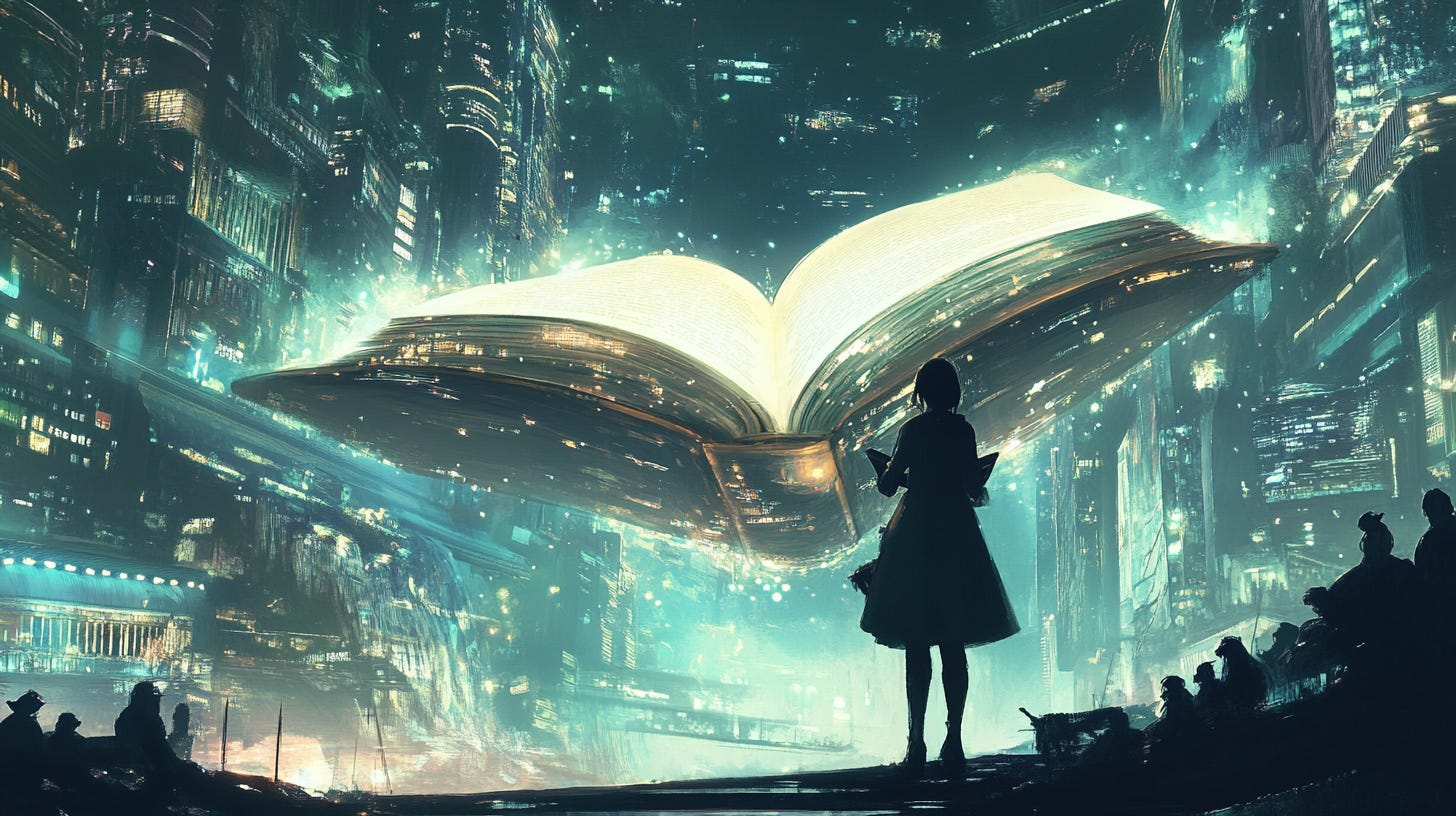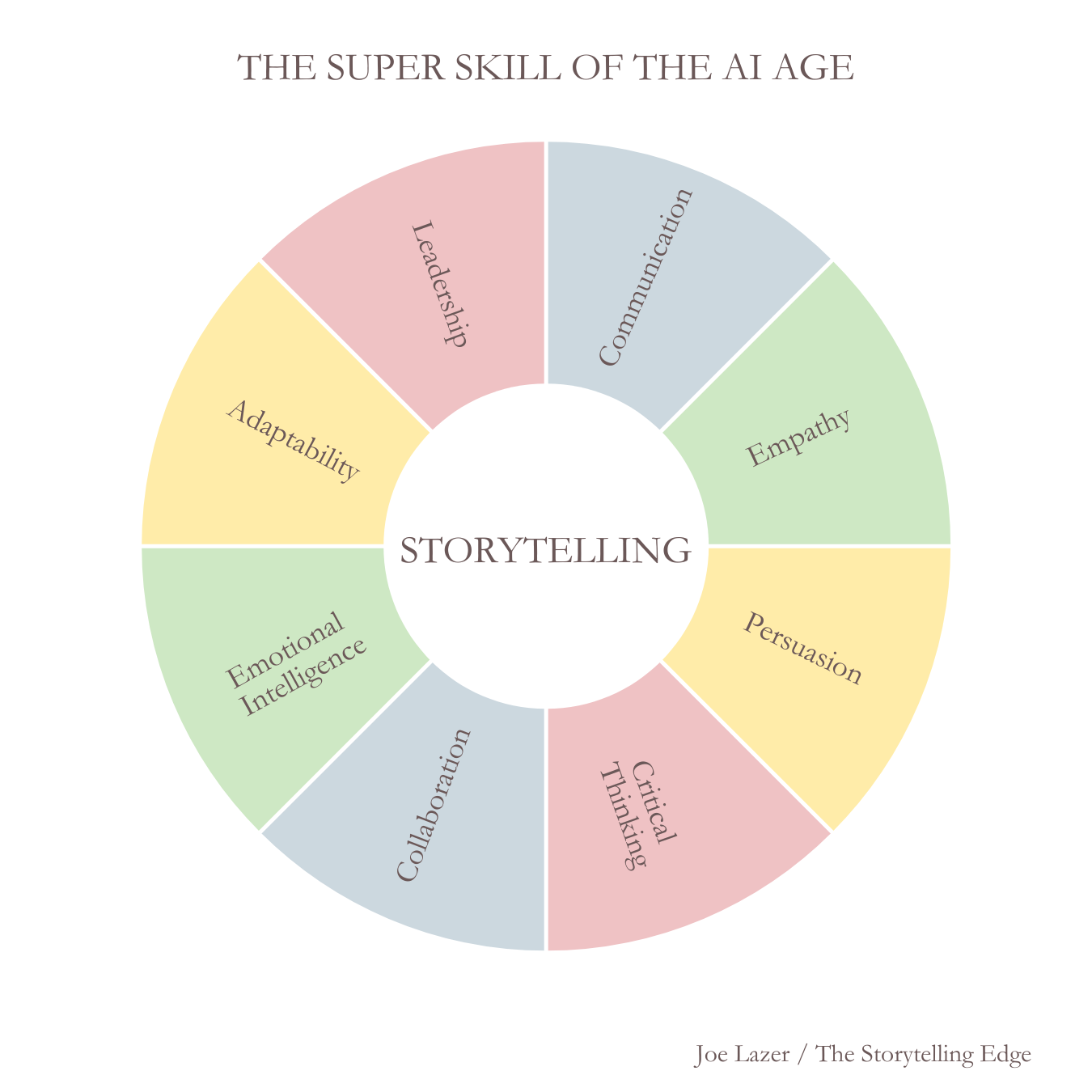Why Storytelling Will Be the Super Skill of the AI Age
AI won’t replace storytellers. Instead, AI will make storytelling the most important skill of all.
In January 2023, I spent a month at home helping care for my newborn son, Max. In the dreary dusk of early parenthood, I grew obsessed with generative AI.
AI wasn’t new to me. I led marketing at an AI company, and my team already used genAI tools regularly. But post-ChatGPT, we were in a rollicking new era. Consumer interest hit a tipping point. ChatGPT hit 100 million users in two months, reaching that milestone 14x faster than any social media giant. It got so big so fast that my 78-year-old aunt made it the theme of her Passover seder. (She even had ChatGPT rewrite the seven blessings.)
The swindlers and zealots came quickly — AI bros who preached AI dogma with an intensity not seen since they were sending Dogecoin to the moon. They predicted AI would put my people — fellow writers and creatives — out of a job, and only the true believers would survive. Prompt or perish.
Staring at my newborn son as he nuzzled to sleep in the early light, I wondered: What if they're right? And even if they’re not, what skills would he need to thrive in a world remade by a tech tsunami?
So, I did what I love to do: I dug deep into AI use cases and research. I interviewed corporate and future-of-work leaders. I tried out all the tools with my team. Before long, I realized the AI bros were very wrong.
AI won’t replace storytellers. Instead, AI will make storytelling the most important skill of all.
There's irony here. We’ve spent the past 20 years worshipping the altar of technical skills, preaching to students that a humanities degree was the fast track to poverty and that coding boot camps were a sure thing. But those supposedly future-proof technical skills may soon be rendered obsolete. As top LinkedIn researchers wrote earlier this year in the NYT: “Technical and data skills that have been highly sought after for decades appear to be among the most exposed to advances in artificial intelligence.” They found that AI will replace 96% of a software engineer’s current skills.
What did these researchers find to be the most durable skills for the next era of work? The ones we’ve long derided as “soft.” Communication. Leadership. Empathy. Critical thinking.
Welcome to the Storytelling Economy
We live in a world where technology will soon do many technical tasks better than us—whether that's thanks to genAI, machine learning, quantum computing, nanotechnology, or just good old-fashioned automation. So the big question facing me, you, and my 21-month-old son is simple: What's our most human ability—the thing we can do uniquely better than machines?
If you examine human history from the moment we developed the capacity for language to our Zoom-addled existence today, the answer is clear: It’s storytelling.
Storytelling is humanity’s superpower. It’s how we transformed from a mid-rate species with few dominant traits into ultra-social learning machines that rose to conquer the earth. It’s how we’ve built bonds, passed down lessons, and taught each other to survive and thrive.
Stories are the cognitive technology that’s empowered leaders to rally people together to discover new worlds, build jaw-dropping wonders, and travel to the moon with the computing power of a modern calculator. Think of all the soft skills that future-of-work researchers and 70% of executives say will be most valuable in this next era: storytelling is the super skill that powers them all.
We lead and rally people through stories. We communicate most effectively through stories. We develop empathy and trust through stories and collaborate best when we feel like protagonists in the same plot. You know that storytelling is durable because it’s been our most important skill for millennia — the trait that makes humans human.
Storytelling doesn’t just help you build stronger relationships at work. It also enables you to build stronger relationships in life, and an 85-year-long Harvard study just revealed that strong relationships are the #1 key to happiness, health, and a longevity. Stories are more than a career hack. As it turns out, they really are chicken soup for the soul.
We are now undergoing a massive shift from the Knowledge Economy to the Storytelling Economy — a system in which storytelling is the super skill that drives success in business and in life. As Scott Galloway said on Pivot earlier this year: “If I could give my 13-and 16-year-old one competence that I think would stand the test of time, it’d be storytelling.”
If you think you’re not a storyteller, I have good news: you’re wrong. We are storytelling animals. As children, we instinctively live in a world of stories. When we fall asleep at night, our brain immerses itself in a world of stories. We all have a storytelling superpower inside of us — we just lose confidence as we get older. But it's always there.
If you want to improve your storytelling skills, subscribe to this newsletter. I’ll share my favorite frameworks and real-world examples in the coming weeks. And if you’re going to Content Marketing World, come to my talk where I'll dive deeper into this shift. Let's win the Storytelling Economy together.
3 Links
Nexus: A Brief History of Information Networks from the Stone Age to AI (Yuval Harari): Please join me in the nerdiest book club read ever.
The Leadership Trait Humans Subconsciously Care About the Most (Forbes): A fascinating story based on our study of voters' subconscious.
Today's Parents: 'Exhausted, Burned Out, and Perpetually Behind' (NYT): A cathartic read for my fellow parents of young kids.
I'm the Fractional Head of Content at A.Team and best-selling co-author of The Storytelling Edge. Click the subscribe button above to join 150k+ marketers who read this newsletter for lessons on the art & science of storytelling in the AI Age.





